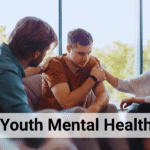Imagine waking up every day feeling like a dark cloud is following you—no energy, no motivation, just an overwhelming sense of dread. For millions worldwide, this isn’t just a bad day; it’s a mental health issue that affects every aspect of life.
Mental health disorders are more common than we think. According to the World Health Organization (WHO), 1 in 4 people will experience a mental health condition at some point. Yet, stigma and misinformation often prevent individuals from seeking help.
This post dives deep into the causes, symptoms, and treatments of mental health issues while offering actionable steps to find support. Whether you’re struggling or supporting someone who is, understanding these aspects can be life-changing.
What Are Mental Health Issue?
Mental health issues encompass a wide range of conditions that affect mood, thinking, and behavior. These can be temporary or chronic, mild or severe, but they all interfere with daily functioning. Common disorders include:
- Depression
- Anxiety disorders (Generalized Anxiety, Panic Disorder, Social Anxiety)
- Bipolar Disorder
- Post-Traumatic Stress Disorder (PTSD)
- Schizophrenia
- Obsessive-Compulsive Disorder (OCD)
Each condition has unique symptoms, but many share overlapping causes and treatments.

Causes of Mental Health Issue
Mental illnesses don’t have a single cause—they result from a mix of biological, psychological, and environmental factors.
1. Biological Factors
- Genetics: A family history of mental illness increases risk.
- Brain Chemistry: Imbalances in neurotransmitters (like serotonin and dopamine) affect mood.
- Hormonal Changes: Postpartum depression, menopause, or thyroid issues can trigger symptoms.
2. Psychological Factors
- Trauma: Abuse, neglect, or childhood trauma can lead to PTSD or depression.
- Chronic Stress: Prolonged stress alters brain function, increasing anxiety and depression risk.
- Personality Traits: Perfectionism or low self-esteem may contribute to disorders like OCD.
3. Environmental Triggers
- Social Isolation: Loneliness is linked to depression and cognitive decline.
- Substance Abuse: Drugs and alcohol worsen or trigger mental health conditions.
- Life Events: Job loss, divorce, or grief can be catalysts.
Understanding these causes helps in early intervention and personalized treatment.
Recognizing the Symptoms
Mental health symptoms vary but often include emotional, cognitive, and physical signs:
Emotional Symptoms
- Persistent sadness or hopelessness
- Extreme mood swings
- Excessive fear or worry
Cognitive Symptoms
- Difficulty concentrating
- Memory problems
- Intrusive thoughts (common in OCD and PTSD)
Physical Symptoms
- Fatigue or low energy
- Changes in sleep (insomnia or oversleeping)
- Unexplained aches and pains
Early detection is crucial. If symptoms persist for more than two weeks and disrupt daily life, professional help may be needed.
Treatment Options for Mental Health Issue
Thankfully, mental health conditions are treatable. A combination of therapies, medication, and lifestyle changes can make a significant difference.
1. Psychotherapy (Talk Therapy)
- Cognitive Behavioral Therapy (CBT): Helps reframe negative thoughts.
- Dialectical Behavior Therapy (DBT): Effective for emotional regulation.
- Exposure Therapy: Used for phobias and PTSD.
2. Medication
- Antidepressants (SSRIs, SNRIs): Treat depression and anxiety.
- Mood Stabilizers: Help with bipolar disorder.
- Antipsychotics: Used for schizophrenia and severe cases.
Always consult a psychiatrist before starting or stopping medication.
3. Lifestyle Changes
- Exercise: Boosts endorphins and reduces stress.
- Healthy Diet: Omega-3s and probiotics support brain health.
- Mindfulness & Meditation: Proven to lower anxiety and improve focus.
4. Alternative Therapies
- Art & Music Therapy: Encourages emotional expression.
- Animal-Assisted Therapy: Reduces loneliness and stress.
How to Seek Help
If you or someone you know is struggling:
- Talk to Someone – A trusted friend, family member, or therapist.
- Consult a Professional – Psychologists, psychiatrists, or counselors can provide a diagnosis and treatment plan.
- Use Helplines & Online Resources – Organizations like NAMI and Crisis Text Line offer immediate support.
- Join Support Groups – Sharing experiences reduces isolation.
Remember: Seeking help is a sign of strength, not weakness.
Breaking the Stigma
Despite progress, mental health stigma persists. Many avoid treatment due to fear of judgment. Here’s how we can change that:
✅ Educate Yourself & Others – Knowledge reduces fear.
✅ Speak Openly – Sharing personal stories normalizes the conversation.
✅ Be Compassionate – A simple “How are you really?” can make a difference.
Final Thoughts: You’re Not Alone
Mental health issues are complex but manageable. Whether through therapy, medication, or lifestyle adjustments, recovery is possible.
If this post resonates with you, don’t hesitate to reach out for help. And if you know someone struggling, share this article—it might be the nudge they need.
Have you or a loved one faced mental health challenges? Share your story in the comments—let’s support each other.
Call to Action:
🔹 Bookmark this post for future reference.
🔹 Share it to spread awareness.
🔹 Subscribe for more mental health insights.
Together, we can create a world where mental health is understood, accepted, and treated with the urgency it deserves. 💙


